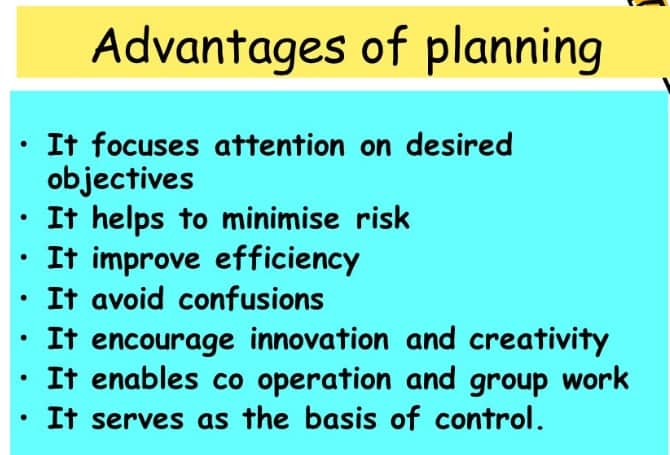The Benefits of Planning: A Comprehensive Guide
In today’s fast-paced world, planning has become an essential skill for individuals and organizations alike. Effective planning can lead to improved productivity, increased efficiency, and better outcomes. In this article, we will explore the numerous benefits of planning and how it can help you achieve success in various aspects of your life.
Enhanced Organization and Time Management
Planning allows you to organize your tasks, set priorities, and allocate resources effectively. By creating a detailed roadmap, you can identify potential obstacles and develop strategies to overcome them. With a well-structured plan, you can optimize your time management skills and ensure that you stay on track to accomplish your goals.
Improved Decision Making
When you plan ahead, you gain a clearer understanding of the potential consequences and outcomes of your decisions. This enables you to make more informed choices and minimize the risk of making hasty or impulsive decisions. Planning provides you with a solid foundation for evaluating alternatives, weighing pros and cons, and selecting the best course of action.
Increased Productivity and Efficiency
Planning helps streamline your workflow and boosts productivity. By breaking down complex tasks into smaller, manageable steps, you can tackle them more efficiently. With a well-structured plan, you can eliminate unnecessary activities, reduce wasted time, and focus on what truly matters. This allows you to accomplish more in less time, leading to increased productivity and improved results.
Effective Resource Allocation
One of the key benefits of planning is the ability to allocate your resources effectively. Whether it’s financial resources, human capital, or materials, planning helps you determine how to allocate them optimally. By analyzing your needs, setting priorities, and aligning resources accordingly, you can maximize their impact and achieve better outcomes.
Reduced Stress and Anxiety
Planning helps alleviate stress and anxiety by providing a sense of control and direction. When you have a well-thought-out plan in place, you can approach tasks with confidence and peace of mind. Planning allows you to anticipate challenges, develop contingency plans, and minimize uncertainties. This proactive approach reduces stress and enables you to navigate obstacles more effectively.
Improved Goal Achievement
Without a plan, goals often remain vague and elusive. Planning provides a roadmap for achieving your objectives. By setting specific, measurable, attainable, relevant, and time-bound (SMART) goals, you can track your progress and stay motivated. A well-designed plan helps you stay focused, overcome obstacles, and ultimately achieve your desired outcomes.
Enhanced Communication and Collaboration
Planning plays a crucial role in fostering effective communication and collaboration. By sharing your plan with others, you can align efforts, clarify expectations, and promote teamwork. A well-communicated plan ensures that everyone is on the same page, working towards a common goal. This facilitates collaboration, improves coordination, and enhances overall performance.
Increased Adaptability and Flexibility
While planning provides structure and direction, it also allows for adaptability and flexibility. A well-designed plan takes into account potential changes and uncertainties. By building in contingencies and regularly reviewing and adjusting your plan, you can adapt to evolving circumstances and seize new opportunities. Planning helps you stay agile and responsive in an ever-changing environment.

Planning is a powerful tool that can significantly impact your personal and professional life. By enhancing organization, improving decision-making, increasing productivity, and reducing stress, planning helps you achieve success in various areas. Whether you are an individual, a business, or an organization, incorporating effective planning strategies can lead to better outcomes, improved performance, and a competitive edge.
Frequently Asked Questions – Benefits of Planning
1. Why is planning important?
Planning is crucial as it helps individuals and organizations set goals, prioritize tasks, allocate resources efficiently, and achieve desired outcomes.
2. What are the benefits of effective planning?
Effective planning leads to improved productivity, better decision-making, increased efficiency, enhanced time management, and overall success in achieving objectives.
3. How does planning contribute to personal growth?
Planning helps individuals identify their strengths, weaknesses, and areas for improvement. It enables them to set personal goals, create action plans, and track progress, leading to personal development and growth.
4. Can planning reduce stress?
Absolutely! Planning helps reduce stress by providing a clear roadmap, reducing uncertainty, and allowing individuals to proactively manage their time, resources, and tasks.
5. How does planning benefit businesses?
Business planning facilitates strategic decision-making, resource allocation, risk management, and goal achievement. It also helps businesses adapt to changing market conditions and stay competitive.
6. Does planning improve financial management?
Yes, planning plays a crucial role in financial management. It helps individuals and organizations set budgets, forecast income and expenses, and make informed financial decisions, ultimately leading to better financial stability and success.
7. Can planning enhance productivity?
Absolutely! Planning allows individuals to prioritize tasks, set deadlines, and allocate resources effectively. By doing so, it enhances productivity, reduces procrastination, and ensures tasks are completed efficiently.
8. How does planning contribute to goal achievement?
Planning helps individuals and organizations set clear, measurable goals and create a roadmap to achieve them. It provides a structured approach, keeps individuals focused, and increases the likelihood of successful goal attainment.
9. Does planning help in managing resources?
Yes, planning is essential for resource management. It helps individuals and organizations allocate resources such as time, money, and manpower effectively, ensuring their optimal utilization and minimizing wastage.
10. Can planning improve decision-making?
Definitely! Planning provides individuals and organizations with a systematic framework to assess options, weigh pros and cons, and make informed decisions. It reduces impulsive choices and increases the likelihood of making sound decisions.




